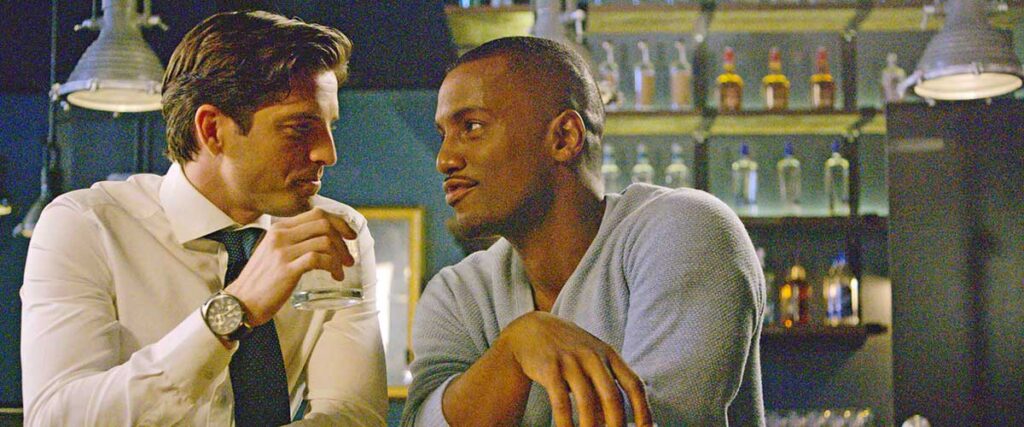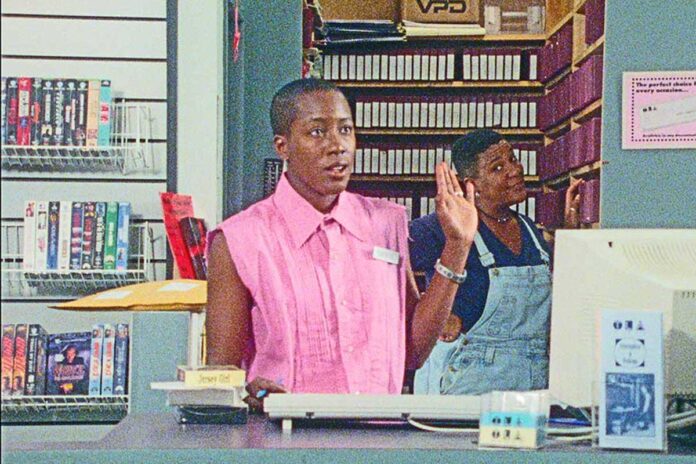There have been several queer-themed films that have either been made by locally-connected Black filmmakers or set or shot in Philadelphia. In honor of Black History Month here are a half dozen titles that warrant some attention.
In 1996, Cheryl Dunye broke new queer cinema ground with “The Watermelon Woman.” She was the first out Black lesbian filmmaker to direct — as well as write, edit, and star in — a feature film. In this scrappy, comedy-drama, set and shot in Philadelphia, Duyne stars as Cheryl, a video store clerk and budding filmmaker, who is fascinated by the (fictional) actress Fae “The Watermelon Woman” Richards (Lisa Marie Bronson), after seeing her play a mammy role in “Plantation Memories,” a film from the 1930s. Cheryl starts a video documentary project investigating Fae’s history because “black women’s stories have not been told.” In the process, she makes some startling discoveries about Fae’s life, work, and relationships as well as her own.
However, “The Watermelon Woman” is about more than just representing Black lesbian experiences on screen; the film’s theme is history. In one sequence, Cheryl meets with Lee Edwards (Brian Freeman), a gay man who talks about the heyday of the Black owned and operated theatres in 1920s and 1930s Philadelphia — the Royal, the Dunbar, and Standard. She interviews out academic Camille Paglia, who offers an analysis of portrayals of race, gender, and sexuality in culture. And in an amusing scene, Cheryl and her colleague Annie (Shelley Oliver) visit C.L.I.T, the Center for Lesbian Information and Technology, where an archivist (out writer Sarah Schulman) effuses about the collection and admonishes Cheryl for filming the materials.
Duyne has paved the way for positive Black lesbian representation. Her film may be more than 25 years old, but it is still significant and highly satisfying. Just as Cheryl looks to the past to understand her present, audiences should watch (or re-watch) “The Watermelon Woman” to look back at where we were and how far we — as well as Dunye, and her cast — have come since her pioneering film.
Another slice of queer Black history is on screen in “Brother to Brother,” the marvelous 2004 film by out gay writer/director Rodney Evans. (Since 2015, Evans has been an Associate Professor at Swarthmore College where he teaches film production and screenwriting). His film concerns Perry (Anthony Mackie), a gay college student, who connects with the Harlem Renaissance writer Bruce Nugent (Roger Robinson). Evans lovingly depicts the 1920s (in nifty black and white scenes) and makes the contemporary scenes bristle as Perry navigates a relationship with Jim (Alex Burns), a white classmate. Evans’ drama is proudly militant as it explores the complexity of being Black and gay, examining racism and homophobia in both the past and present. The film includes snippets of the works of Langston Hughes and James Baldwin, among others great gay Black writers, but it mostly serves as a valentine to Nugent, reminding viewers of the importance of his work.

Writer/director Doug Spearman’s sleek Philly-set romantic drama “From Zero to I Love You,” concerns Jack (Scott Bailey), a white, married (to a woman) father of two who unexpectedly falls for Pete Logsdon (Darryl Stephens), a gay Black man. Their affair consists of secret — and sometimes missed — meetings as well as promises by Jack that he will leave his wife Karla (an excellent Keili Lefkovitz) for Pete. Spearman depicts the ebbs and flows of the relationship and features scenes with each man’s friends, families, and lovers to show what makes Jack and Pete not just tick but possibly click. As Pete, out gay actor Darryl Stephens delivers a thoughtful performance, playing a fictionalized version of Spearman — a man who has a penchant for married guys and a fear of commitment.
“Cover” from 2008 is an ambitious thriller set and shot in Philadelphia about Dutch (Razaaq Adoti), a husband and father on the down low. This low-budget noir concerns Valerie (Aunjanue Ellis, currently nominated for an Oscar for her role in “King Richard”) who is accused of the murder of Ryan Chambers (Leon). The mystery plays out like a made-for-cable film with cheesy dialogue and stilted acting. (Alas, a scene of two men sharing a steamy shower isn’t all that steamy.) But director/producer Bill Duke’s intriguing, underseen film addresses many important issues — from how homosexuality is seen by the church, how Black men are viewed by their fathers as well as their community, and the dangerous spread of HIV among men on the down low and their partners and wives. “Cover” may not be entirely successful, but it is an interesting misfire.
And then there are the cinematic contributions made by Lee Daniels. The out (and outspoken) Philadelphia native made his directorial debut, “Shadowboxer” (2005) in Philadelphia. The film has the terminally ill Rose (Helen Mirren) and her lover/stepson, Mikey (Cuba Gooding Jr.) protecting Vicki (Vanessa Ferlito), a pregnant woman Rose was hired to kill. The astonishing — there is no other word for it — erotic thriller features scene after scene that will likely have viewers clutching their pearls.
In contrast, Daniels’ sophomore film, “Precious,” (2009) based on the novel “Push” by Sapphire, was met with tremendous acclaim. (Daniels was Oscar nominated for directing and producing.) The story concerns an illiterate, pregnant-for-the-second time (by her father) African-American teenager named Clareece “Precious” Jones (Gabourey Sidibe in her Oscar-nominated debut), who is mentored by a lesbian teacher, Ms. Rain (Paula Patton). The film is full of wild, tense, emotional moments and dazzling performances. (Mo’Nique won an Oscar for her supporting role as Precious’ abusive mother.) Daniels shrewdly mixes gritty realism — viewers can smell the bucket of chicken Precious steals in one scene — with magical flights of fancy, such as an homage to “Two Women,” where the characters speak Italian. It’s a stunning film, and screenwriter Geoffrey Fletcher made history as the first Black writer to win an Oscar for Best Screenplay.
